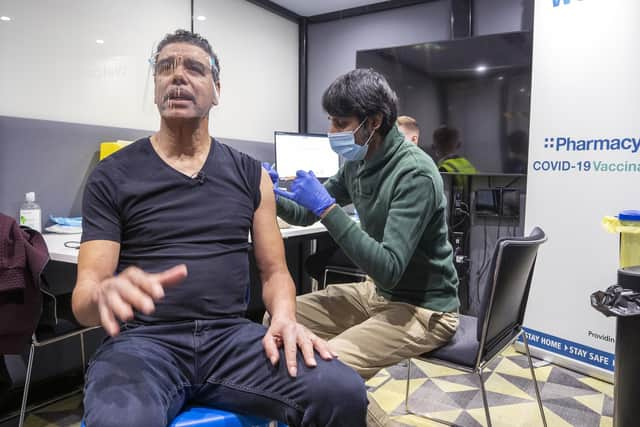Covid-19 vaccine hesitancy: Not helpful to 'lump people together' under BAME, says public health expert
Policies must address individual groups, Professor Vittal Katikireddi, Senior Clinical Research Fellow at Glasgow University and honorary NHS Consultant in Public Health, told a conference on Wednesday.
Speaking to a Covid-19 symposium hosted by the Royal College of Physicians of Edinburgh, Prof Katikireddi said the vaccination programme has exacerbated health inequalities, and that governments and clinicians must take action to reduce them.
Advertisement
Hide AdAdvertisement
Hide AdOne important measure is to consider vaccine hesitancy in terms of specific ethnic groups, rather than among the BAME group as a whole, he said.


Prof Katikireddi said: “We know that the levels of vaccine hesitancy vary quite a lot across ethnic groups, but importantly, it's not that all ethnic minority groups are hesitant in terms of vaccination.
“We can see really large differences, with several ethnic minority groups actually having fairly similar levels of vaccine hesitancy as the white British group, but with some groups that's not the case, especially in the black and black British groups, and Pakistani and Bangladeshi groups.
“That highlights the importance of actually trying to drill down into specific ethnic groups, rather than lumping everyone together within the concept of BAME for example.”
The most specific recent figures available from Public Health Scotland show that by mid-March, some 73 per cent of white Scots aged 60 to 64 had received a first dose of Covid-19 vaccine, compared to 69 per cent of Asian Scots in that age group.
This figure was lower in the Caribbean or black group – 66 per cent – and just 54 per cent in the African group.
Scotland has “lagged behind” the rest of the UK in the collecting and monitoring of data about health and inequalities, Prof Katikireddi said.
He added that research has found social factors often play a major role in determining health inequalities related to the Covid-19 pandemic.
Advertisement
Hide AdAdvertisement
Hide Ad“When we try and account for different factors across ethnic groups compared to the white British group, often it tends to be social factors that are most important,” he said.
Differences in exposure to the virus, which could be as a result of working in different types of jobs, may play a role, he said.
So too could differing vulnerability to the disease, as well as different social consequences.
He added: “And then also sometimes some of the things that we might do as public health professionals, or as a government, may work less well for people from an ethnic minority community, or the adverse consequences of some of those measures – for example things like lockdown measures – might be greater for some groups as well.
"For example, we know that often, ethnic minority groups are more likely to work in insecure employments, such as zero hours contracts, and therefore if there is a lockdown they might be more likely to experience financial loss and the associated health consequences.
A message from the Editor:
Thank you for reading this article. We're more reliant on your support than ever as the shift in consumer habits brought about by coronavirus impacts our advertisers.
If you haven't already, please consider supporting our trusted, fact-checked journalism by taking out a digital subscription.
Comments
Want to join the conversation? Please or to comment on this article.